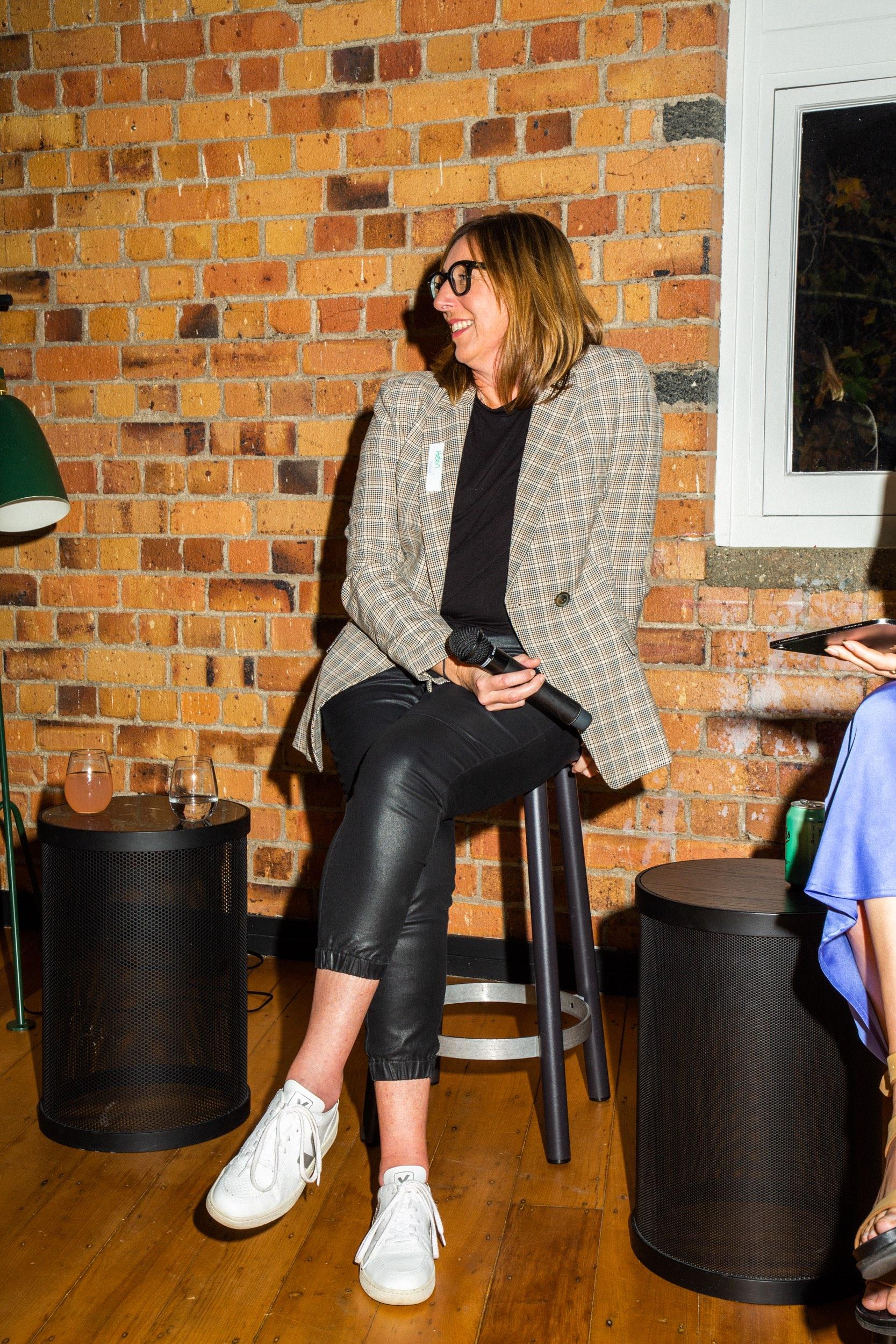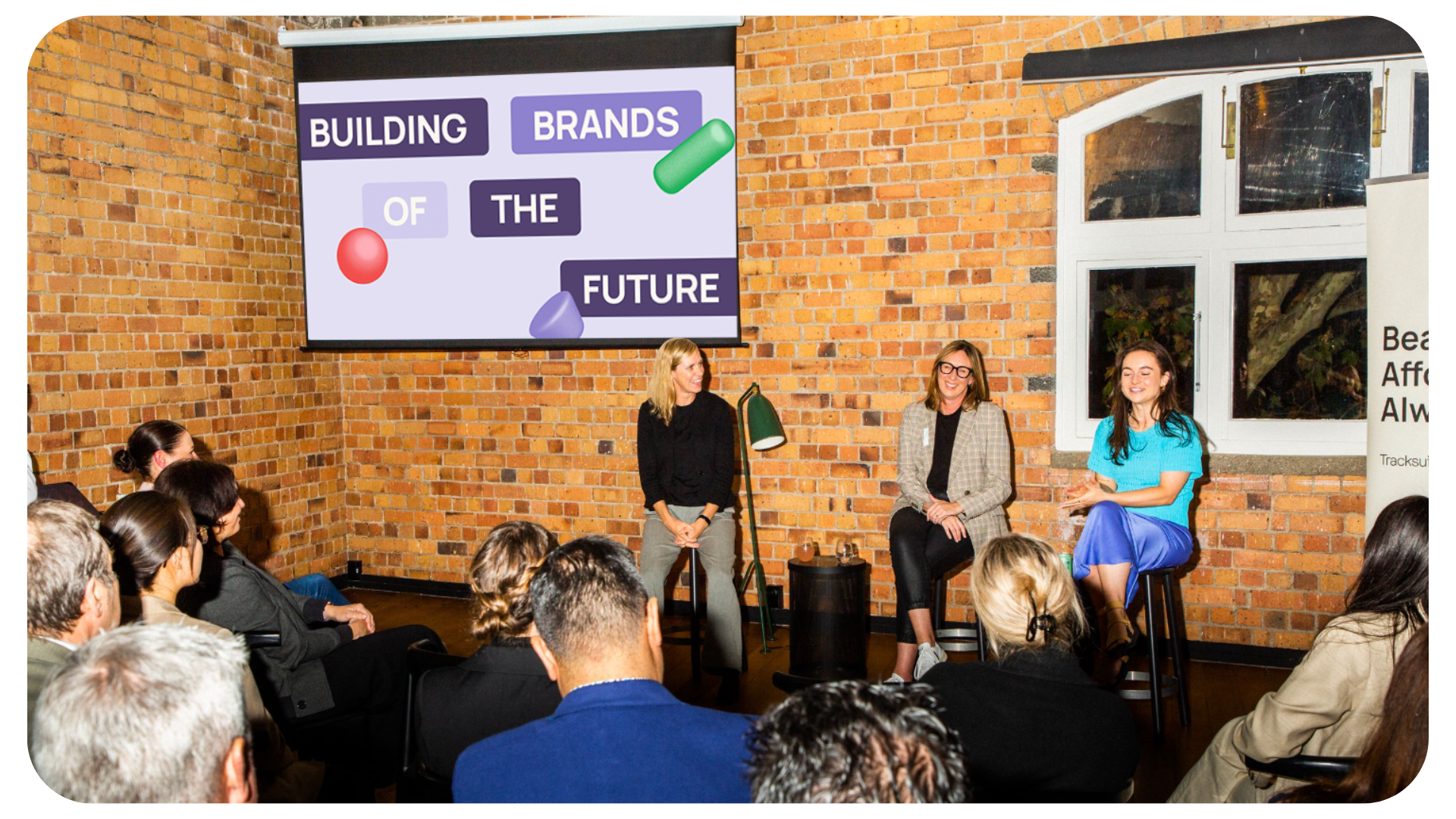Marketing Director Helen Costello on why marketing is about emotion, not function

Helen Costello was one of two incredible panel speakers at our New Zealand Building brands of the future event. Here’s some of the insights she shared in conversation with Tracksuit and Jemma Whiten.
Helen brought a wealth of experience into the room at Building brands of the future, considering she’s basically New Zealand FMCG royalty. She’s currently Marketing Director at The Collective and has also previously worked at the intersection of marketing and insights at Lion and Cerebos on some of New Zealand’s most iconic brands.
Helen started her career working as a Merchandiser for Griffins, and it was in that role she realized how important the brand powering a chocolate chip cookie was.
“Very early on I realized that I wanted to actually work on brands that have a really strong emotional connection with consumers,” she says. “I love that what we do brings joy, simplification or improvement to lives.”
Now at The Collective, opens in new tab, a small-but-mighty dairy yogurt company that’s growing incredibly fast, Helen says she has again seen the impact of the brand’s visual identity.
“One of the things that happened when I first joined The Collective is people would ask what it was, and when I explained, they’d say, ‘Oh, the yogurt with the cow on it?’ That's when it dawned on me that actually a brand is more than just a word – it’s what it means to people.”
We’ve pulled together some of the insights Helen treated us to on the night below.
Sign up to Shorts
For fortnightly brand insights, stories and goodness that'll help you win (we promise).
Pros and cons of marketing small businesses versus big businesses
Helen has spent a lot of time under the hood at both big and small FMCG brands. She says she doesn’t have a preference, but one of the main differences she’s noticed in her career is the bigger the budget, the more risk averse teams become.
“At bigger businesses, you tend to stick to tradition and don’t change things up. In smaller businesses, you don’t have the budgets so you’ve got to find ways to do things differently,” Helen says.
“You've got to pick up the telephone and talk to people, you've got to trust the 21-year-old to bring your brand to life on platforms that you aren't familiar with. You play things quite differently. I think the beauty is in having the opportunity to shift between corporate and small business – I don’t think either one is better than the other. It's just a different way of doing things.”
One of the big brands that Helen has worked at was Lion, which has the Steinlager, Speights, Corona beer brands under its umbrella. During her time there, Helen was part of the team that brought the iconic Steinlager Toyko Dry beer to market in 2016. She says the project took three years to see the light of day (which is a lifetime in FMCG).
“It was a job of convincing the business that this was a great opportunity, as it was at a time when craft beer was taking off and everyone was drinking it,” Helen says.
“The question became, ‘Why would you want to make a drinkable lager?’ But when you actually started to talk to consumers, particularly younger consumers, they didn't actually like the taste of craft beer. They liked the branding and what it said about them from a lifestyle perspective, but they didn't actually like the taste.
“We came to the business with a proposition of a Japanese style lager under the Steinlager brand, and it was initially a hard sell within the business and with our customers. But we kept working away at it and engaging with thought leaders across industries: we talked to designers, architects, retail assistants and other people that didn’t drink beer.”
After much research and perseverance to get internal buy-in, the beer launched to great fanfare and sales immediately began flying. Helen says it was the quickest beer brand at Lion to sell one million liters within 9 weeks.
“By the time it came to market, we had customers scrambling to be the first to bring it into their stores,” she says.
The lesson learned from that experience is it’s not so much about failure, Helen says. It’s about perseverance.
“It’s about frustration and dealing with procrastination and changing minds, and it comes back to that emotional connection. In marketing, you can’t wrap a story around function – it’s about emotion. You’ve got to find a way around the roadblocks to get there eventually,” she says.
The insane success of Steinlager Toyko Dry beer was also a good reminder that brands that’ve been around a while should be focused on staying relevant to a modern audience.
“You can't continue to live in the past – you've got to continue to evolve and you've got to be across culture and what's happening in the world,” Helen says.

Fighting the good fight against short-termism
While all industries are battling against the pressures of quarterly targets and annual budgets, FMCG is a particularly short-term focused area of business. Strong sales at stockists are critical in order to maintain or grow shelf space, so brands are hyper-focused on the here and now.
“Short-termism is FMCG, and the long-term in FMCG is a month, or a couple of weeks,” Helen says. “It’s a reality. You've got to be really careful that you balance it out – you can't look too far into the future, because the future is going to change.
“But this is where a really good, clear strategy comes into place really early on, which means you can plan and be able to ebb and flow with the changes.”
Then there’s also the challenge of marketing marketing and getting the business on board with what you’re doing so you can get sign-off for long-term brand building.
Helen’s advice is to find something that you know you’re going to win with and get some runs on the board so that rapport and trust is built between marketing and and other teams.
“I know it sounds a bit conniving, but it really does work,” she says.
Helen says it’s also important to speak the language of the CFO, rather than marketing jargon.
“I’m not a numbers person – when I think about numbers I start to sweat – but when I start speaking the finance team’s language about ROI, they can see the value and start to back what you’re doing and where you’re going,” she says.
“It’s amazing when you get a CFO that starts to understand branding and they become your biggest advocate. It’s like the yin and the yang: you can be quite effective, together.”
We couldn’t agree more on that allyship, Helen. 🤝
A massive thanks to Helen for sharing her smarts with us at Building brands of the future. If you want to connect with this legend, you can find her on LinkedIn., opens in new tab



